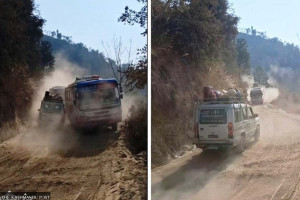Koshi Province
Nepali women being sent to Hong Kong on fake Indian IDs
Arrest of 7 Nepali women, 2 men at India-Nepal crossing lays bare how traffickers hoodwink border surveillance.
Parbat Portel
Despite the active presence of more than half a dozen non-governmental organisations working against human trafficking and girl trafficking along the eastern border of Nepal, a criminal network has managed to smuggle young Nepali women into India.
The recent arrest of seven young women and two men at the Panitanki border point in India has again exposed how traffickers are successfully hoodwinking border surveillance and exploiting legal loopholes to send Nepali women to Hong Kong using fraudulent Indian documents.
On Friday, seven women aged between 16 and 21, along with two men, crossed the Mechi river and entered India through the Kakadbhitta-Panitanki crossing. They escaped the attention of Nepali Police as well as NGO representatives stationed at the border.
But Sashastra Seema Bal (SSB), the border security force of India, stopped the group for an identity verification. Initial questioning revealed they were allegedly heading abroad for employment, prompting the SSB to hand them over to Khoribari Police of India for further investigation.
During the investigation, Indian authorities found that the group was en route to Hong Kong. What was of even greater concern was that the seven women were in possession of Indian passports and Aadhaar cards, in addition to Nepali documents.
“We had gone to the police station to facilitate the rescue of the girls and hand them over to their guardians. The India police were preparing paperwork to send them back. But once Indian passports, Aadhaar cards, and Nepali documents were found in their possession, the Indian police refused to release them,” said Govinda Ghimire, chief of Kakadbhitta office of Maiti Nepal, a Nepali NGO that works to rescue trafficked women. The women are currently in custody of Indian police as they continue to investigate document fraud charges.
Two men—Dipesh Gurung, aged 41, of Toribari in Darjeeling and Japan Gurung, aged 61, of Makalu Rural Municipality-3 in Sankhuwasabha—were arrested for their suspected involvement in the trafficking. Indian police confirmed that all seven women are also originally from Sankhuwasabha.
According to Ghimire, had the Indian passports not been discovered, the group would have been handed over to Nepali authorities. But once the Indian documents came to light, the police said the women could not be released.
This is not the first time such an incident has happened. Last year, two women from Dharan were caught crossing into India via the Mechi Bridge with both Nepali citizenship certificates and Indian passports. The recurring cases highlight the systematic operation of a trafficking network that is converting Nepali citizens into Indian nationals on paper in order to send them to Hong Kong for work.
The root of the issue lies in Hong Kong’s immigration policy. Since 2005, Hong Kong stopped issuing work or domestic helper visas to Nepali nationals. However, no such restriction exists for Indian citizens. This disparity has created a thriving black market for Indian identity documents among Nepalis desperate for jobs abroad.
Hong Kong is an attractive destination due to big demand for domestic workers and relatively higher wages. Despite being home to an estimated 30,000 Nepali workers, most are undocumented and face serious risks.
Nepali women unable to secure legal passage are often lured by traffickers who promise them jobs in Hong Kong. To bypass restrictions, the traffickers provide them with counterfeit Indian Aadhaar cards, voter IDs, and passports. These fake documents are produced in Indian cities like Siliguri and Bagdogra, where organised criminal syndicates operate for profit.
According to one detainee, victims are charged between Rs300,000 and Rs500,000 per person for the entire package, including Indian documentation and a Hong Kong employment visa.
The smuggling ring also takes advantage of direct flights from major Indian airports—Delhi, Mumbai, Bangaluru, Hyderabad and Chennai—to Hong Kong. One such trafficking attempt was foiled recently at Kempegowda International Airport in Bangalore.
On June 11, a 26-year-old Nepali woman was arrested while trying to board a Cathay Pacific flight using a forged Indian passport. Originally from Nepal, the woman had been living in Haryana, India, for some time. She had already booked a flight and obtained a Hong Kong employment visa as well.
According to Zubin Johnson Vaidya, the immigration officer who filed the police report, Rai arrived at Terminal 2 around 9:20 pm for her 1:20 am flight. Along with the flight ticket and visa, she presented an Indian passport (number 859442.) When asked for additional identification, she produced an Aadhaar card. On further questioning, she also showed her Nepali national identity card stored on her mobile phone.
Rai was immediately arrested on charges of possessing identity documents from two countries, which is prohibited by law. She has been charged under Sections 336 and 340 of the Indian Penal Code for creating and using forged documents, as well as under the Passport Act of 1967.
If found guilty, she could face up to seven years in prison, two additional years under the Passport Act, and fines up to Rs50,000. Foreign nationals convicted of such offences may also be deported. Police confirmed that the Nepali woman had obtained her Aadhaar card and voter ID in West Bengal, which she used to acquire her Indian passport.




 23.27°C Kathmandu
23.27°C Kathmandu












